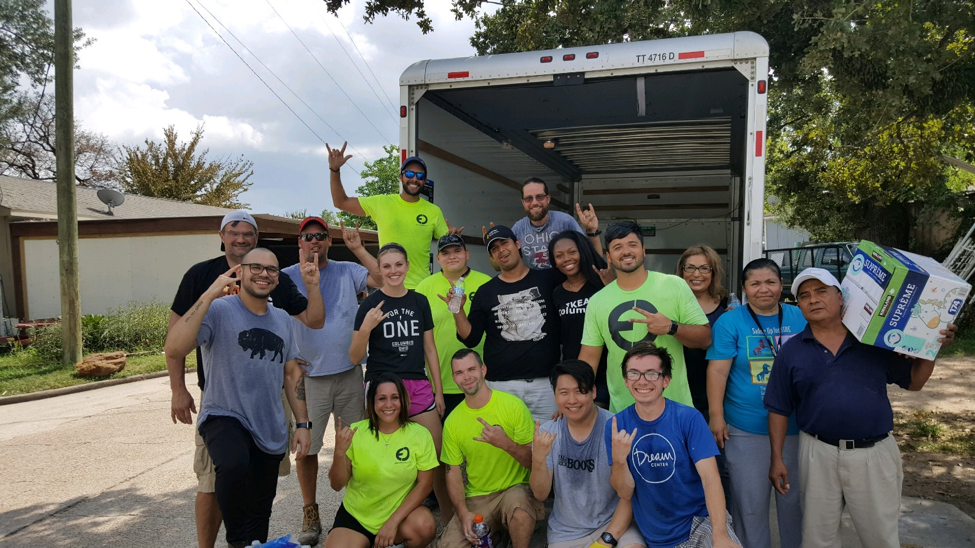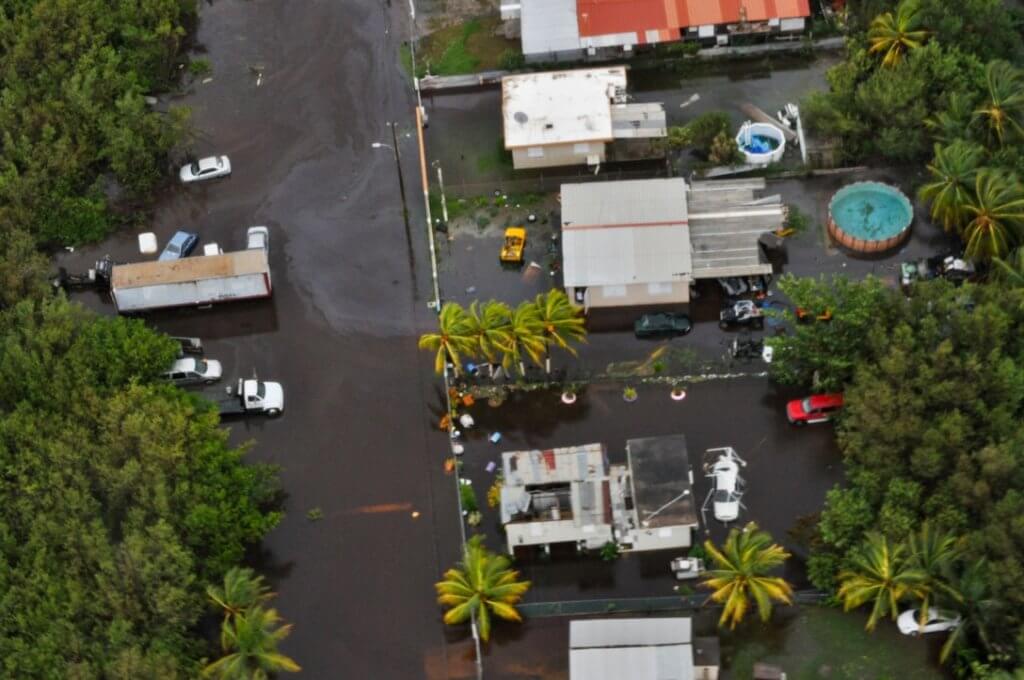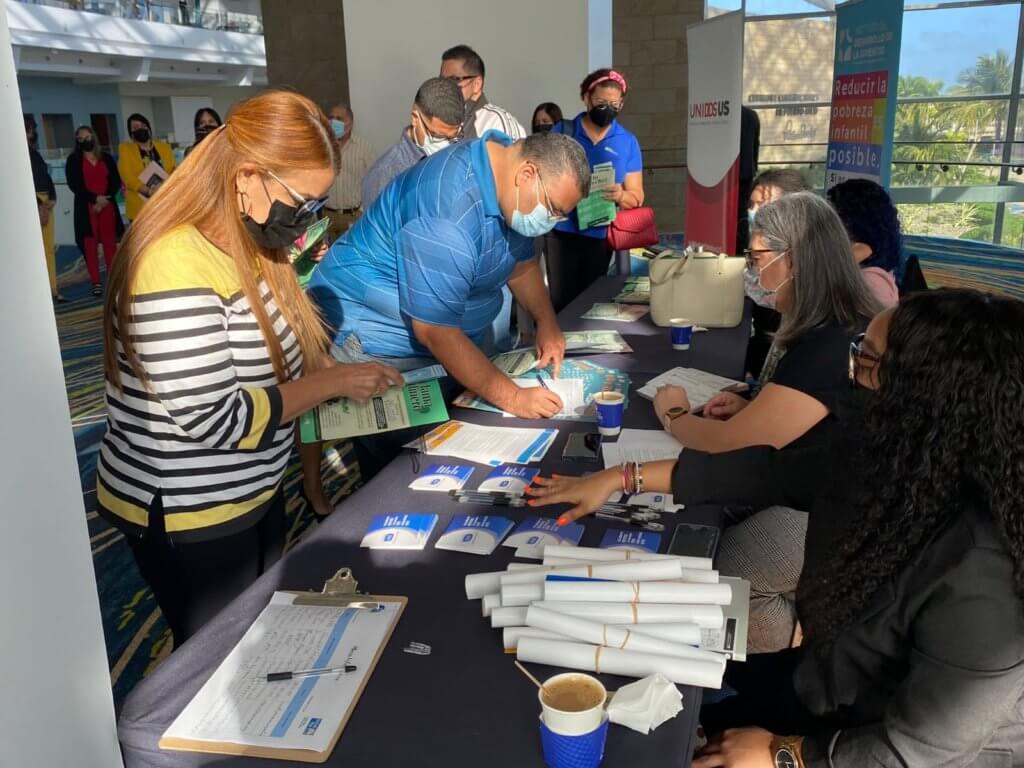Unidos for Houston and Miami: The Role of Community-Based Organizations in Disaster Relief Efforts
UnidosUS Affiliates are helping families rise stronger after devastating Hurricanes Harvey and Irma

After Hurricanes Harvey and Irma hit Texas and Florida, community-based organizations—including members of the UnidosUS Affiliate Network—worked with affected families to fill the gap between the resources available through the national and local government and the communities in need. These local organizations, as trusted members of their communities, served as crucial local partners to disaster relief agencies like the American Red Cross to deliver culturally sensitive and linguistically appropriate services to families.
Keep up with the latest from UnidosUS
Sign up for the weekly UnidosUS Action Network newsletter delivered every Thursday.
Latino families—especially newcomers or those living in rural or remote communities—faced unique difficulties in the aftermath of Hurricanes Harvey and Irma. For example, not all families were aware of the assistance and resources available locally to communities through U.S. government programs such as FEMA, Supplemental Nutrition Assistance Program (SNAP), and local Department of Children and Family Services divisions, or knew how to navigate the process of disaster relief. As affected families tried navigating the system to request assistance, local organizations such as the American Latino Center for Research, Education and Justice (ALCREJ) in Houston, Coalition of Florida Farmworker Organizations (COFFO) in Homestead, and Hispanic Services Council in Tampa—all UnidosUS Affiliates—stepped in. In many cases, these organizations became advocates and liaisons for families. They worked tirelessly to disseminate information on resources, conducting individual check-ins to understand specific needs and direct families to the appropriate organizations for assistance. The impact in each community was immense.
American Latino Center for Research, Education and Justice, Houston, Texas
After Hurricane Irma hit Houston, it was all hands on deck at ALCREJ. Because ALCREJ has deep roots in their community and existing relationships with many families, they were well-positioned to maintain daily contact after the storm hit. As a result, ALCREJ knew families’ specific situations, and could assist them with their needs. Partnering with Elevate Church, a nondenominational Christian church, and Talento Bilingüe de Houston, a cultural arts center, ALCREJ assisted families in applying for FEMA, securing food, water, clothing, and other essentials. “We had more than 400 volunteers helping us from as far as Arkansas and Ohio to serve more than 300 hot meals,” described Rita Farias, ALCREJ Executive Director. “More than 8,500 items were distributed among them water, food, toiletries, clothing, and cleaning supplies.”

The assistance became crucial in Houston communities where families were fearful of asking for help due to concerns with police or potential immigration implications. ALCREJ acted as a voice for families as they coordinated services with the Red Cross and local churches, ensuring that families could receive hot meals twice a day, water, and vouchers for essentials without fear.
While ALCREJ was seen as a trusted voice for families that were affected in their community, ALCREJ’s impact was also felt on a more individual level. For example, ALCREJ volunteers mobilized quickly to aid an elderly couple whose home had been flooded. ALCREJ volunteers helped the couple clean out their home and obtain food and water. They also brought the couple medical assistance and have stayed in contact to ensure that their needs were met. In another instance, they secured private donations of shoes, clothes, and other school supplies for the four children of a family whose breadwinner was in the hospital.
Coalition of Florida Farmworker Organizations, Homestead, Florida
COFFO has more than 40 years of experience enhancing the living and working conditions of migrant and seasonal farmworkers and the rural poor in Florida. As a result, they were already seen as a trusted pillar of their community, which allowed them to play a significant role providing food assistance and resources to families. COFFO directed families to local pantries and the Red Cross, provided vouchers to pay for food and utilities, and assisted qualified families with their SNAP applications as part of their Comprando Rico y Sano program, a UnidosUS initiative funded by the Walmart Foundation. The assistance was particularly crucial in Immokalee—a rural area in Florida—that had no power for weeks and the community needed to know where to go for food and water. COFFO also referred families to local mental health services to those who needed them. The organization used its extensive network of local groups as well as radio, email, and word of mouth to inform community about local resources available. For example, promotores de salud, or community health workers, went door to door in some cases distributing information to help families in a way that is responsive to their language and cultural needs.
Hispanic Services Council, Tampa, Florida
Areas served by HSC, like Wimauma, depend on the crucial bilingual and bicultural services the organization provides as families live in rural or remote communities and are not typically reached with timely information. For example, families had little awareness of resources available locally to communities. In other instances, when families called the Red Cross or FEMA and asked for a Spanish-speaking representative, they were sent to another number because representatives did not speak Spanish—limiting access to services. In other cases, assistance was provided according to a person’s county, region, or address, causing confusion among families who were unsure where they needed to go. Affected families did not only worry about losing their home, but also about whether contacting a federal agency would have negative implications for them and their safety. Certain assistance sites had heavy military or police presence, making it uncomfortable for families to access services.
In order to best serve their community, HSC kept their staff up to date on the latest information from partner organizations and resources available to those affected to better serve their community. HSC also rallied together in different places within the county where they knew the community would be. Promotores de salud strategically visited high-traffic areas in Hillsborough County such as churches and food pantries to connect with people, share resources available, and help families maneuver the process to get assistance. Promotores de salud answered questions and assisted people and families in filling out the Food for Florida emergency food assistance form—available to SNAP recipients whose food was spoiled or lost as a result of Irma. Zulema Uscanga, Program Manager at HSC, reported that their assistance went as far as assisting a family that was expecting a new baby and had just lost their home in the storm. HSC sought clothing donations and a crib for the newborn. They were also connected with FEMA and the Red Cross for shelter, food, and other needs. Maristela, a promotora de salud, used her bilingual skills to call on the family’s behalf and translated information. Zulema looked up information about FEMA and its aid to those ineligible for federal services.
HSC’s efforts were also vital in securing last-minute shelter for migrant families who were required by local farms to work late to protect their fields and plants before they could go home and prepare for the storm.
While the road to recovery will be long, the unity among our communities gives us hope. Many families will receive assistance through FEMA and their insurance companies, but those who don’t qualify for these services or don’t have insurance depend on local organizations, their communities, and neighbors so they can rebuild their lives.
Our Affiliates are the heart and soul of UnidosUS, and we know that they will continue working hard in Texas, Florida, and most recently in Puerto Rico to help those affected by these devastating storms because they have always taken up the call in times of need. However, their hard work alone is not enough. This will be a long recovery as organizations around the country work to build up our diverse communities that were affected by these natural disasters. We continue to call on this administration and Congress to work quickly and decisively to fund recovery and reconstruction efforts.
This blog post is part of Comprando Rico y Sano, a program supported by the Walmart Foundation.


